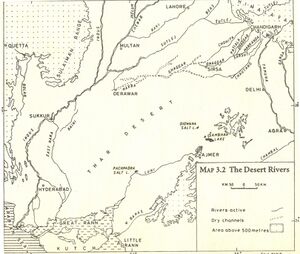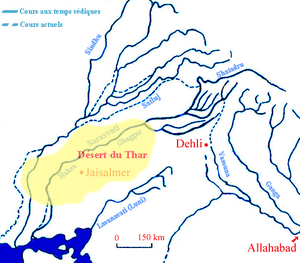Ghaggar
| Author:Laxman Burdak, IFS (Retd.) |


Ghaggar-Hakra River (घग्गर हकरा) is an intermittent river in India and Pakistan that flows only during the monsoon season.
Variants
The identification
The river is known as Ghaggar before the Ottu barrage and as the Hakra downstream of the barrage.[1] The Ghaggar-Hakra is generally identified with the Vedic Sarasvati River by most scholars, though it is disputed whether all Rigvedic references to the Sarasvati should be taken to refer to this river. The identification of the Vedic Sarasvati River with the Ghaggar-Hakra River was accepted by Christian Lassen,[2] Max Müller,[3] Marc Aurel Stein, C.F. Oldham,[4] and Jane Macintosh. According to proto-historian Michel Danino, in ancient times a mature river flowed into the Ghaggar-Hakra River valley and into the Rann of Kutch, which he identifies as the Rig Vedic Sarasvati river.[5]
Ghaggar River
The Ghaggar is an intermittent river in India, flowing during the monsoon rains. It originates in the Shivalik Hills of Himachal Pradesh and flows through Punjab and Haryana states into Rajasthan;[6] just southwest of Sirsa, Haryana and by the side of Talwara Lake in Rajasthan. This seasonal river feeds two irrigation canals that extend into Rajasthan.
The present-day Sarsuti (Saraswati River) originate in a submontane region (Ambala district) and joins the Ghaggar near Shatrana in Punjab. Near Sadulgarh (Hanumangarh) the Naiwal channel, a dried out channel of the Sutlej, joins the Ghaggar. Near Suratgarh the Ghaggar is then joined by the dried up Drishadvati (Chautang) river.
Hakra River
The Hakra is the dried-out channel of a river near Fort Abbas City in Pakistan that is the continuation of the Ghaggar River in India. Several times, but not continuously, it carried the water of the Sutlej and Sarasvati during the Bronze Age period.[7] Many settlements of the Indus Valley Civilisation have been found along and inside the river beds of the Ghaggar and Hakra rivers.
External links
See also
References
- ↑ Britannica, Dale Hoiberg, Indu Ramchandani. Students' Britannica India, Volumes 1-5. Popular Prakashan, 2000. ISBN 978-0-85229-760-5. ".."
- ↑ Indische Alterthumskunde
- ↑ Sacred Books of the East, 32, 60
- ↑ Oldham 1893 pp.51–52
- ↑ Michel Danino: The Lost River - On the trail of the Sarasvati (Penguin Books, 2010). ISBN 978-0-14-306864-8.
- ↑ Sarasvati: Tracing the death of a river
- ↑ Mughal 1997
Back to Rivers/Rivers in Pakistan

